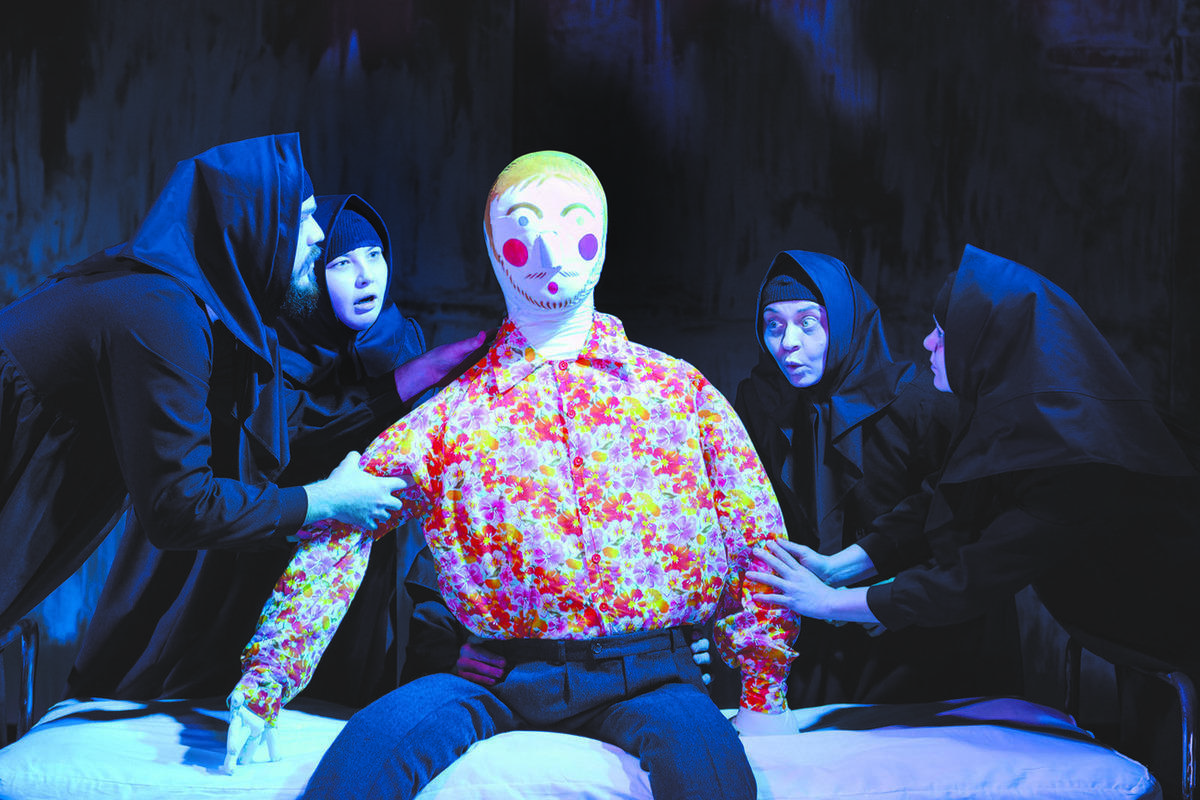Victoria Pechernikova staged the play “The Man in a Closed Room”
[ad_1]

At the Poisk Theater from Lesosibirsk we talked to our dead father
The Biennale of Theater Arts is taking part in a “lost tale” (this is how the genre was whimsically defined) – “Man in a Closed Room” by the Lesosibirsk theater “Poisk” from the Krasnoyarsk Territory. The play was staged by director Victoria Pechernikova based on the play by Tatiana Zagdai, written about those whose childhood and youth occurred in the 90s.
Victoria Pechernikova is already a well-known and talented director who has staged plays in Biysk, Kaluga and Moscow, and has worked at the School of Modern Play, Et cetera, Sphere and the Taganka Theater. The number of educational institutions and courses she completed dazzles the eyes. There is the opera department of the Galina Vishnevskaya school, the acting department of the Institute of Contemporary Art, and the Moscow Institute of Open Education with a specialty in “leader of a children’s theater group.” Plus, there is a directing group from the musical theater department and a parallel course by Dmitry Bertman at GITIS, and there is also a directing department and Oleg Kudryashov’s workshop…
The play “The Man in a Closed Room” became famous thanks to the Lyubimovka festival. It was staged more than once, and not so long ago at the Theater. A very bright performance by Pavel Parkhomenko, also a student of one of the best teachers of GITIS, Oleg Kudryashov, appeared at the Moscow City Council. Tatyana Zagdai wrote a story about thirty-year-olds and prefaced the play with the words that her generation is the children of fathers who lost their country and did not find themselves in a changed world. It’s about people whose childhood was in the 90s.
The play is good because it allows for multiple interpretations and allows for improvisation, which is why the performances turn out so different. In Parkhomenko, for example, Pushkin appears among the heroes, and in Victoria Pechernikova – “grandmothers,” as she calls them: certain creatures responsible for the clan, they are like servants of the proscenium, constantly on hand, with whitewashed faces, as in the Japanese Kabuki theater. Among the “grandmothers” there are not only actresses, but also two actors. They are all in black: either nuns or Babarikha’s grandmothers. Their faces are deathly pale – not even faces, but snouts. An eerie people named in the theater program by the neutral word “inhabitants.” They become the guiding star of a tragic road movie in the style of the 90s, poetically complemented by the ritual traditions of the Russian North.
The main character Zhanna, aka Anka (played by Irina Shvets), comes from Moscow to her small homeland to bury her father, with whom she has not communicated for more than ten years. She changed her first and last name in order to finally free herself from the nightmare of her past life, from her alcoholic father who did not care about her. During their lifetime, they never really had a chance to talk. My father loved to drink heavily and lived his own separate life, but now, having become a dead man, he became emotional. Thus begins Anya’s journey into childhood, a series of memories of old emotional wounds and grievances.
On holidays, everything is closed in a provincial town. Here, practical old women delay their own death – they don’t die on holidays, they wait for Monday, when ritual and medical institutions open, and it will be possible to depart to another world as human beings. It’s just Ani’s dad who didn’t plan his departure. I organized a “holiday” for my daughter.
The dead father was played by the magnificent actor Viktor Charikov, who was remembered from “Dead Souls” directed by Oleg Lipovetsky, where only three actors played all Gogol’s characters. And dad Vitaly Semenovich appears for the first time in the form of a human-sized rag doll, in a colorful shirt, which the “grandmothers” carry out. Maxim Makarov plays childhood friend Kostya. Anya was once friends with him, and now he is the only one who agreed to take her with her dead father in the back seat – to medical facilities and to the crematorium. Kostya has a suspended sentence, but he is willing to take risks just to have at least some income.
Artist Alexandra Novoselova came up with a metaphorical solution. On the stage there is a curtain that periodically opens and closes, a real wrecked car from Soviet times, quite a “bird-three” with three passengers, one of whom is a dead man.
The play begins and ends with the words that the most important thing in our lives is time and who you give it to, because you can change everything, but you can’t return it back. It is literally drummed into us and even prescribed in the program that a child needs the love and attention of his parents, and dislike affects him for the rest of his life. Traumas and grievances of the past determine our future, but it is important to be able to forgive and accept parents for who they are. And we are often not ready for this. Zhanna-Anya, who left for the capital in search of a better life, remained a provincial. She brought the village with her to Moscow. And finding herself in her native outback years later, she suddenly became imbued with compassion for what she was trying to escape from.
Newspaper headline:
Conversations with a dead father
[ad_2]
Source link






